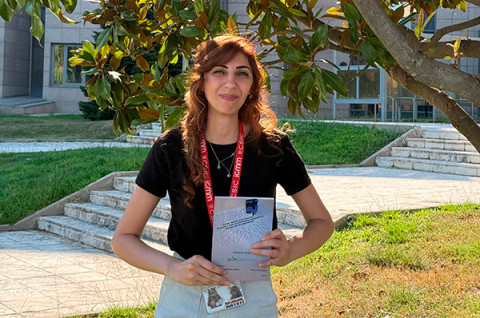Gülsüm Ersü, new doctor: "I like to work on technologies that have a positive environmental impact"

Gülsüm Ersü is now a doctor in Material Sciences. Her work, entitled as 'Paper-Based Electronics: Scalable and Sustainable Fabrication based on 2D Materials', has been supervised by Andrés Castellanos-Gómez at the Materials Science Institute of Madrid (ICMM-CSIC). Last week, she just defended her thesis and got her title as a new doctor.
The young researcher explains that the aim of her thesis is to explore sustainable approaches for fabricating paper-based electronic and optoelectronic devices. "Special emphasis is placed on integrating two-dimensional (2D) materials, known for their excellent electrical and optical properties, into paper substrates," she wrotes in the official abstract of her work. "The work presents cost-effective fabrication strategies and addresses key challenges in material deposition and device performance. Demonstrated applications include thermoelectric devices and fully dissolvable photodetectors, contributing to the development of flexible and environmentally friendly electronics," she concludes.
Why did you choose ICMM for your PhD?
I chose ICMM because it offered an excellent environment for cutting-edge research in nanoscience, which aligned closely with my academic interests. I was especially interested in joining the 2D Foundry group and working with Dr. Andrés Castellanos-Gomez, whose research on 2D materials I had followed during my Master’s studies. The combination of innovative research topics, specialized facilities, and a collaborative environment made ICMM the ideal place to develop my PhD project.
How would you explain your research to a non-scientific audience?
My research focuses on making electronic devices more environmentally friendly. Instead of using the usual hard-to-recycle plastics or metals, I use paper as a substrate. On top of that, I add very-thin materials, called 2D materials, which are thinner than a human hair but have unique electrical properties. The idea is to develop cheap, flexible devices that can be recycled, biodegrade, or even dissolve in water after use, so we’re not stuck with mountains of e-waste.
What are the main applications of your research? Could you give us an example?
My research can be applied in areas like disposable sensors. One example is a photodetector I developed on soluble paper, which can sense light and completely dissolve in water after use. This makes it suitable for short-term applications and helps reduce electronic waste.
What are the lessons you had learnt here? which one do you value the most?
During my PhD, I’ve learned a lot about designing experiments independently and troubleshooting technical problems. I’ve also learned the importance of patience and persistence—research takes time, progress can be slow, and staying motivated through failures has been one of the most valuable lessons for me, both professionally and personally. Beyond the scientific side, I’ve also realized how important it is to take care of ourselves and support the people around us.
How do you think this experience will contribute to your training and to your future?
This experience has trained me to think critically, solve problems independently, and manage long-term projects, skills that are essential not just in research but in any professional environment. I’ve also gained hands-on experience with advanced fabrication and characterization techniques, which I believe will be valuable for future work in both academia and industry. Beyond technical skills, this PhD has taught me how to handle challenges, work in international teams, and communicate my work clearly, qualities that will help me adapt and grow in any future role.
What are your plans once you finish your PhD?
After finishing my PhD, I would like to continue working in research. I’m especially interested in continuing with projects related to sustainable materials and flexible electronics, where I can apply the skills, I developed during my PhD and also learn new techniques. In the long term, I’d like to work on technologies that have a positive environmental impact.
Why did you become a scientist? Who have been your role models?
I became a scientist because I wanted to contribute to something meaningful. I’ve always admired people who used science to make life better for others. Figures like Marie Curie have been a huge inspiration to me—not just for her groundbreaking discoveries, but for her determination at a time when women had very few opportunities in science. Coming from Türkiye, Atatürk’s emphasis on education and science, especially on empowering women, has also deeply influenced me. Seeing more women in science today motivates me to continue and hopefully inspire others as well.
ICMM
Sor Juana Ines de la Cruz, 3
Cantoblanco, 28049
Madrid, España
Teléfono: (+34) 91 334 90 00
Email: @email
Oficina de Comunicación/Prensa: @email

Acknowledge the Severo Ochoa Centres of Excellence program through Grant CEX2024-001445-S/ financiado por MICIU/AEI / 10.13039/501100011033

Contacto | Accesibilidad | Aviso legal | Política de Cookies | Protección de datos